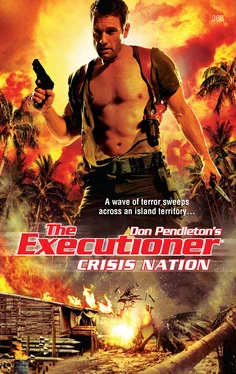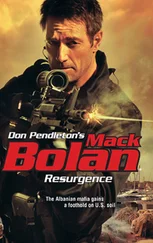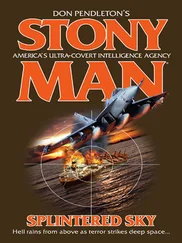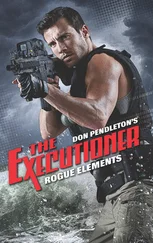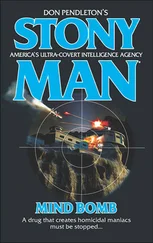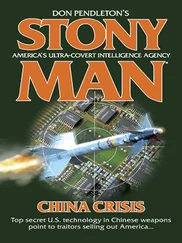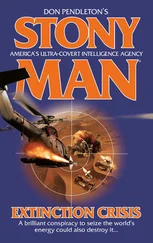“Everybody down!” the Executioner shouted
The machine gun outside slammed into life like doomsday. The wooden walls of the museum were no defense against the cigar-sized bullets that passed through them like they were paper. Glass display cases shattered in explosions of shrapnel shards. Juanita was the only one to have disobeyed Bolan, and she paid for it as a burst from the crew outside sacrificed her to the revolution. The machine gun outside slammed into life like doomsday. The wooden walls of the museum were no defense against the cigar-sized bullets that passed through them like they were paper. Glass display cases shattered in explosions of shrapnel shards. Juanita was the only one to have disobeyed Bolan, and she paid for it as a burst from the crew outside sacrificed her to the revolution.
Bolan glanced at the Beretta in his hand. They were definitely outgunned.
The weapon outside suddenly fell silent as it burned up its one-hundred-round belt. The crackle and pop of small-arms fire filled the gap as the machine-gun crew reloaded. Bolan rose to a crouch. It was time to move. “Everyone behind me!” he shouted.
The Executioner threw himself down again as he heard an unmistakable sound and the real hell-storm began.
Six-foot streaks of fire geysered through the hundred machine-gun holes perforating the museum walls. Somebody had brought along a flamethrower. They were upping the ante.
The Executioner ®

www.mirabooks.co.uk
When you are occupying a position which the enemy threatens to surround, collect all your force immediately, and menace him with an offensive movement.
—Napoleon I
1769–1821
Maxims of War
When my enemy thinks I am surrounded and have no way out, I will take the opportunity to make my own attack.
—Mack Bolan
THE MACK BOLAN LEGEND
Nothing less than a war could have fashioned the destiny of the man called Mack Bolan. Bolan earned the Executioner title in the jungle hell of Vietnam.
But this soldier also wore another name—Sergeant Mercy. He was so tagged because of the compassion he showed to wounded comrades-in-arms and Vietnamese civilians.
Mack Bolan’s second tour of duty ended prematurely when he was given emergency leave to return home and bury his family, victims of the Mob. Then he declared a one-man war against the Mafia.
He confronted the Families head-on from coast to coast, and soon a hope of victory began to appear. But Bolan had broken society’s every rule. That same society started gunning for this elusive warrior—to no avail.
So Bolan was offered amnesty to work within the system against terrorism. This time, as an employee of Uncle Sam, Bolan became Colonel John Phoenix. With a command center at Stony Man Farm in Virginia, he and his new allies—Able Team and Phoenix Force—waged relentless war on a new adversary: the KGB.
But when his one true love, April Rose, died at the hands of the Soviet terror machine, Bolan severed all ties with Establishment authority.
Now, after a lengthy lone-wolf struggle and much soul-searching, the Executioner has agreed to enter an “arm’s-length” alliance with his government once more, reserving the right to pursue personal missions in his Everlasting War.
Chapter 1
Chapter 2
Chapter 3
Chapter 4
Chapter 5
Chapter 6
Chapter 7
Chapter 8
Chapter 9
Chapter 10
Chapter 11
Chapter 12
Chapter 13
Chapter 14
Chapter 15
Chapter 16
Chapter 17
Chapter 18
Chapter 19
Chapter 20
Laguna San José, Puerto Rico
Bolan stared at the three stripped bodies as they bobbed in the shallow water. They had bloated up from being in the salt marsh overnight. Bruises encircling the wrists and ankles showed that the two policemen and one policewoman had been bound. Brutal contusions on other parts of the policewoman’s body showed that she had endured other abuses before she had been decapitated with her fellow officers. San Juan CSI had marked off the area with stakes in the silt wrapped with crime-scene tape. It was impossible to get a car down there in the mud, so a harbor patrol fan boat was making its way through the reeds. Bolan glanced up as a passenger jet roared out of Luis Muñoz Marin International Airport across the lagoon. Heat shimmered off the causeway loaded with morning traffic crossing the shallow waters. At nine o’clock in the morning, it was already ninety degrees. He glanced back at the bodies. It was getting to the point that the police no longer waited to be called. Every morning harbor patrol sent out small boats to the lagoon and more often than not they came back with bodies.
“This is bad, Señor Cooper,” Inspector Noah Constante said, using Mack Bolan’s cover name for this mission. He was a lanky man in a television-blue guayabera shirt and a white Kangol driving cap. He had a coppery complexion, a hooked nose and slightly almond-shaped eyes that spoke of indigenous Taino Indian blood. A pencil-thin mustache completed his look. With the Colt .45 pistol automatic tucked into the front of his tropical white silk pants, he looked like the world’s most dangerous golf caddy. He lit another cigarette and tossed the old butt into the water. “Very bad.”
Bolan nodded. Beheading was a favorite of method of “warning murder” with the Mexican drug gangs, and it was quickly becoming popular throughout Central and South America. To Bolan’s knowledge this was the first time it had been used by political revolutionaries in the Caribbean, much less in a commonwealth of the United States.
Much less against United States military police personnel.
Puerto Rico’s political status was unusual to say the least. It was currently considered an “enhanced commonwealth” of the United States and its politics were split fairly evenly along three diverging lines. There were those who wanted to maintain the status quo, and they had won referendums to keep it that way in six decades of votes on the subject. There were those who wanted Puerto Rico to become the fifty-first state of the United States and join the republic.
And there had always been a Puerto Rican independence movement.
Since the 1800s there had been those who had wanted to kick out the Spanish colonizers. When the United States had invaded the island during the Spanish-American War, there had been those who had wanted to kick out the Yanquis. That had been mollified a great deal when Harry S Truman gave all Puerto Ricans American citizenship. Still, there had always been those who sought, and sometimes fought, to gain nation-status for the Caribbean island. The Nationalistas were the smallest of the three political affiliations, but they had always been the most vocal.
They had also been the one to turn to violence.
Until recently it had always been small-scale, and most of even the most ardent of those who dreamed of Puerto Rican independence shunned violence as a means to achieve it. Now, times seemed to be changing. It had begun with rumors that the U.S. military was storing nuclear weapons on the island. Political activists had begun protesting outside U.S. military bases and Puerto Rican police stations. The actions by military policemen to round them up and take them away from the bases had made news worldwide. When a protestor had been shot trying to break into Fort Buchanan, the protests had broken out into street-rioting in the capital. Tear gas and rubber bullets had been used and the rioting and looting had gotten worse.
Читать дальше
